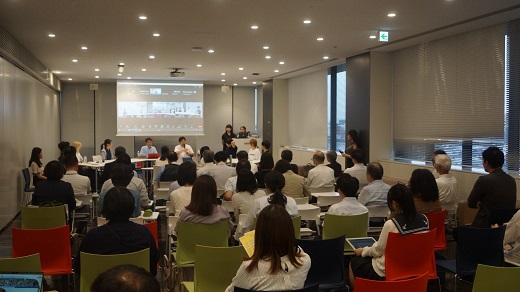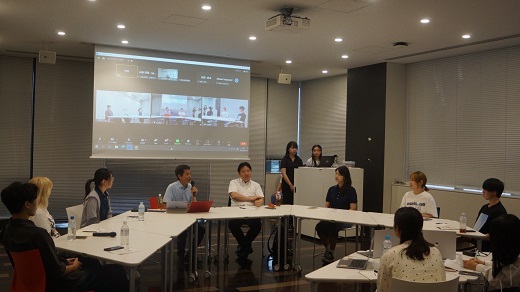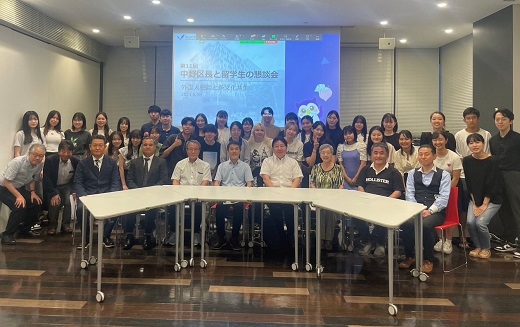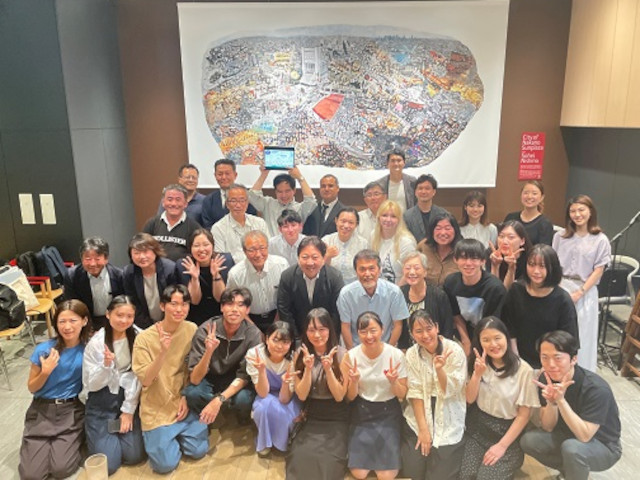[School of Global Japanese Studies] YAMAWAKI Seminar held a meeting with Nakano Ward Mayor and foreign students
Aug. 29, 2024




On June 26, 2024, YAMAWAKI Seminar of the School of Global Japanese Studies held a meeting between the mayor of Nakano Ward and foreign students called “Consultation for Foreigners and Multicultural Coexistence.” This is the 11th meeting, in which six students from China, South Korea, Hong Kong, Russia, and Japan and Nakano Ward Mayor SAKAI Naoto took the stage. Professor YAMAWAKI Keizo facilitated the meeting. The speakers gathered at the presentation space of the Nakano campus, welcomed about 40 guests and listeners to the venue, and conducted the event in a hybrid format, which was broadcast via Zoom. About 35 people attended the lecture on Zoom, and the total number of participants exceeded 100 from inside and outside Meiji University, including the seminar students.
*Short video
*Graphic recording by Mr. YAMAWAKI Hideaki
(Japanese text only)
The following six students took the stage, all of whom live in Nakano Ward.
The seven guests are Mr. TAKAMURA Kazuya (Director of the Cultural and Industrial Promotion Department, Nakano Ward), Mr. SHIDA Hiromichi (Standing Director, Secretariat of Association for Nakano International Communications), Mr. MIYAJIMA Shigeaki (President of the Nakano-ku Kankou Association), Ms. SHIMADA Kazuko (Representative Director of Acras Japanese Language Education Institute), Mr. YOSHIKAI Akira (Representative Director of Plain Japanese Tourism Initiative), Mr. INOMATA Takeshi (President and Representative Director of Language One Corporation), and Mr. Cesar Cabrejos (Operating Officer of Language One Corporation).
At the beginning of the meeting, the seminar students reported on the survey of the counseling service for foreigners in Tokyo. In May this year, Nakano Ward’s new counseling service for foreigners was set up along with the relocation of the Ward Office to a new building. The purpose of the survey was to investigate the actual situation of the efforts of other wards and to find out the direction that Nakano Ward should aim for when it comes to counseling foreigners. The following items were examined: (1) supported languages, (2) reasons for selecting supported languages, (3) system of helpline for foreigners, and (4) number of consultations. These surveys were conducted by phone and email directly to the city staff. The survey found that many local governments have counselors who speak mainly English and Chinese, and that multilingual services are available on tablets. On the other hand, YAMAWAKI Seminar offered seven suggestions to Nakano Ward Mayor, based on the possibility of limiting the number of foreigners who visit the counter by limiting the number of available languages, the fact that there are variations in the number of consultations, and the fact that the staff at the counter may not have expertise in helping foreigners. <Survey report>(Japanese text only)
During the panel discussion, the six students who took the stage gave their impressions of the new government building and their impressions of actually using the counseling service for foreigners. After that, they gave suggestions on what they liked about the service and how to improve it. “I usually study Japanese, so I feel lonely when people suddenly talk to me in English. I want staff to ask me what language I want to use before I tell them about the consultation.” “It is difficult to fill in improvements in the questionnaire after the consultation in front of the counselor. I would like to be able to answer the questionnaire outside the ward office.” and so on.
In a questionnaire conducted after the meeting, respondents made the following comments: “It was a rare opportunity to hear the voices of foreign students on municipality policies.” “I thought it would be good to see a discussion between the ward mayor and a foreign student at a very close distance, and the administration considering improvement measures based on actual concerns and suggestions.” “It was found that the original meaning of easy Japanese and the importance of Japanese people close to the region being able to accept foreigners and introduce them to helplines were important.” “I was able to hear the live voices of the foreign students and felt the positive attitude toward multicultural coexistence of the ward as a whole.” “The seven recommendations are concrete and can be implemented immediately. Many of them are excellent.” and “As a university seminar, they conducted various surveys, coordinated with foreign students and the ward mayor, and the process of making proposals to the administration was excellent.”
Below are the comments of the international students who participated as speakers.
“Through this meeting, I felt that the feeling of distance and concerns experienced many times as a foreigner living in Japan have changed from unsolvable to solvable. It was a meeting in which I felt a sense of security about my future life in Japan because I felt a sense of trust that someone could help me. (GO Doye, Meiji University)
“I was very nervous at first because the opportunity to speak to the ward mayor in person like this is very valuable, but the mayor, the professor, and the students of Meiji University were kind, and I gradually became able to express my thoughts in this warm atmosphere. I’m so glad I joined.” (YU Runyao, Eastwest Japanese Language School)
“I really enjoyed participating in the meeting between Nakano Ward Mayor and foreign students. Not only did I communicate my opinions directly to the ward mayor, but my interactions with various people became a valuable experience during my studying abroad. (KLIMOVA Anastasiia, Eastwest Japanese Language School)
Thoughts of the seminar students who were in charge of planning and managing the meeting.
“I participated in the meeting in two roles, as one of the speakers for international students as well as the person in charge of the meeting. This meeting is arguably one of the most important events in YAMAWAKI Seminar’s various activities. I’ve never done anything like hosting an event before, so I was honestly worried that I would really be in charge of such an important event. However, thanks to the cooperation of various people such as the members in charge of the meeting, the professor, and other seminar students, I think the seminar went smoothly. Moreover, through this meeting, I was able to do many things that I didn’t think I could do. For example, I went to two ward offices by myself and asked the staff there to conduct a survey. I am not good at speaking in front of many people and get nervous when people pay attention to me, but I participated in this meeting as a speaker and was given the opportunity to speak in front of people. By participating in this meeting, I was able to do many things that I have never done before and never thought I could do. Through these experiences, I think I was able to grow as a person. So I’m really glad I decided to join YAMAWAKI Seminar and take charge of this event. (3rd year, WONG Shun Hei)
“At this meeting, I discussed with foreign students living in Nakano Ward about the consultation service for foreigners established with the relocation of Nakano Ward Office’s new office building, and participated from a Japanese perspective. I am pleased to have been able to participate in this valuable opportunity to touch on the thoughts and concerns of foreign students through the meeting and to make recommendations directly to the ward mayor. It was very impressive that the ward mayor and those involved in consultations took the opinions of us speakers seriously. In addition to the counseling service for foreigners, I also made a proposal for the new government building, and I heard that they have actually started to make a floor map. Since there is no time after the relocation of the ward office, I felt it was very meaningful for both the ward office officials and the residents of Nakano Ward. After the meeting, I hope the ward office will be better for both Japanese and foreigners. (3rd year, ISHIMARU Junki)
“Even before I participated in YAMAWAKI Seminar, I was very interested in this meeting, so I participated this time. The project had many challenges in the process from the initial theme decision to the actual meeting, but we all worked together and it ended successfully. In particular, I realized the importance of a quick response and unity. Advice from experts and materials from senior students were also very helpful and helped us in many ways. At first, I was worried about whether the problems in the counseling service for foreigners could actually be improved through the meeting, but I realized the possibility that individual voices and experiences could directly lead to improvements by showing improvements even before the actual event, such as the guide display of “Counseling for foreigners” on the ticketing machine, which had not been seen before. I also recognized that the diverse perspectives and cultural backgrounds of international students are valuable resources in resolving issues. At first, the four of us started the event planning, but later members who had returned from studying abroad and third-year and fourth-year seminar students also participated, and it became a big event involving the whole seminar students. Through this experience, I learned a lot and I feel that the unity among the seminar students has deepened further. I would like to thank all the participants for their experiences and achievements through this meeting. We hope to continue to build on this valuable experience and use it for future activities. (3rd year, PARK Soomi)
“This was the first time in history that all of the speakers were living in Nakano Ward, so there was a lot of lively opinions. In addition, the mayor of Nakano Ward and the person in charge of the contact point for foreigners positively considered the proposal to establish a forum for exchange between local residents and foreign residents, thereby expanding the scope of the seminar’s activities, and I think it exemplified the value of cooperation with the local community and administration. I was the moderator on the day, and there were many occasions where I was required to respond in an ad hoc manner, such as immediately communicating mutually and giving accurate information when a problem occurred, in addition to other duties such as time management and announcements. It was a rewarding job in that I felt I had learned how to respond instantly. Based on this meeting, I felt the need for opportunities not only for international students but also for foreigners living in Japan to express their opinions and to engage in activities that strive for mutual understanding. In the future, we would like to further deepen our cooperation with local communities and work to create a place of multicultural coexistence.” (3rd year, TOJI Sakura)
“I joined the members in charge of this meeting midway. Before joining the seminar, I was worried that I, who lacked more knowledge than other members, would not be allowed to participate as a key member of the meeting, the first big event of the third year of YAMAWAKI Seminar. However, after participating in the event, I was inspired to cooperate using my knowledge to the fullest extent, as I saw the main members working hard on the content of the presentations and actually taking foreign students to the ward office to make the meeting better. On the day of the meeting, I was a little nervous because I had to accept the role of moderator, a role with a lot of responsibility, but in the meeting, Mayor Nakano told us that what had been discussed in past meetings was gradually improving, and I felt very happy to participate in an important event that was important enough to be involved in the ward’s policies. The response to the questionnaire after the meeting was also very good, so I was glad that I worked hard as a key member of the meeting even though it was a short time. There was an unexpected accident where the recording of ZOOM didn’t go well, but I hope to make future events better by taking advantage of this reflection.” (3rd year, FUJISAWA Ayaka)
This time, I participated as a member of the survey report of the counseling service for foreigners in the Tokyo metropolitan area and played a very important role in directly informing the ward mayor of the proposal. In the process of actually inquiring about each municipality by ourselves, we have had many opportunities to pay attention to details that we had never been aware of before, and to be very aware of the existence of foreign residents and multicultural coexistence. I feel that my understanding of multicultural coexistence has deepened even more than before. During the panel discussion, we were able to hear various points of improvement and opinions about the ward from the perspective of foreign students, which made us realize things that Japanese people cannot realize. I hope that this meeting will help not only Nakano Ward but also other municipalities to promote multicultural coexistence. (3rd year, Deputy seminar leader, IKAI Chisa)


